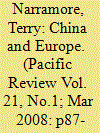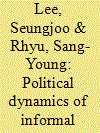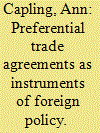| Srl | Item |
| 1 |
ID:
080628


|
|
|
|
|
| Publication |
2008.
|
| Summary/Abstract |
Ever closer relations between China and Europe over the last decade have sparked speculation about an emerging axis or balance of power vis-à-vis the United States. China, the European Union and its key member states have expressed a preference for a more balanced international order based on multilateral institutions. Despite a rapid and extensive expansion in economic and political relations between China and the European Union, there is no evidence for balancing against the United States in strategic areas. Rather, the variations in the positions of China, the European Union and the United States can more accurately be seen as policy or interest bargaining. Because the European Union does not share US security interests in the Asia-Pacific region, the European Union and its key member states can seem at variance with the US position on China. Bargaining over the failed attempt to lift the European Union's arms embargo against China shows that the European Union and the United States are not so far apart on strategic issues in the Asia-Pacific.
|
|
|
|
|
|
|
|
|
|
|
|
|
|
|
|
| 2 |
ID:
080624


|
|
|
|
|
| Publication |
2008.
|
| Summary/Abstract |
Decisions that affect the life chances and wellbeing of citizens are increasingly being made in international settings that are only indirectly connected to the democratic institutions where those citizens have a voice. Global and regional governance organizations not only lack the democratic legitimacy of states but also there are few mechanisms that make them accountable to the citizens that their decision making most affects. Civil society groups have exposed this gap between the jurisdiction and the impact of supra-state organizations and have proposed various ways of addressing it. Feminist analysis has highlighted the masculine preserve of traditionally closed-door multilateral trade and security discussions and negotiations. It has also highlighted the unequal and deeply structural gender impact of this style of policy making. Women's movements have found international organizations to be especially challenging institutional settings within which to achieve policy influence. Yet transnational feminist networks have the political and ethical resources to make global governance organizations more accountable to a broader constituency. This article explores this phenomenon through an examination of the Women Leaders' Network (WLN) and its efforts to make Asia Pacific Economic Cooperation more accountable to women as political and economic actors. The WLN is the only women's transnational advocacy network to have directly and routinely engaged with an economic intergovernmental organization. An analysis of the limits and potentials of the WLN model highlights accountability issues for APEC (Asia Pacific Economic Cooperation) and other regional or global governance organizations, as well as for the WLN and transnational civil society networks more generally
|
|
|
|
|
|
|
|
|
|
|
|
|
|
|
|
| 3 |
ID:
080627


|
|
|
|
|
| Publication |
2008.
|
| Summary/Abstract |
Timor-Leste is among the youngest nations in the world. It began its independence under difficult circumstances: poverty is widespread, education is poor, the industrial sector is non-existent, and political turbulence is on the rise. On the positive side, future oil revenues are predicted to be substantial, which could potentially be a great help in Timor-Leste's struggle for development. This paper examines critically the possibility for Timor-Leste to use oil revenues to achieve economic development. It describes how difficult it is to estimate the future revenues because of volatile prices, territorial disputes, and insufficient seismological mapping. It continues with a discussion of the 'resource curse' - the difficulty of combining natural resources with economic development. Moreover, the particular challenges for Timor-Leste's development are dealt with at some length, as are possible ways to avoid the resource curse.
|
|
|
|
|
|
|
|
|
|
|
|
|
|
|
|
| 4 |
ID:
080626


|
|
|
|
|
| Publication |
2008.
|
| Summary/Abstract |
Dense informal networks between public- and private-sector elites have long been identified as a key institutional feature that had underpinned rapid economic development in many East Asian countries. With the outbreak of the Asian financial crisis in 1997, however, a number of scholars have cast doubt on the long-term efficacy of informal networks, discrediting the East Asian model as crony capitalism. Although these debates renewed our interests in the role of informal networks in East Asia, they fall short of highlighting the real dynamics underlying informal networks. Parachute appointment in Korea - political appointment of ex-politicians and ex-bureaucrats into public and private corporations - is a prime example demonstrating political intervention in the formation and management of informal networks.We argue that the nature of political competition in Korea is a key to understanding the underlying dynamics of informal networks. First, Korean politicians, the president and the ruling party have actively engaged in making and maintaining the networks of parachute appointment. Second, owing to its politicized nature, parachute appointment is neither institutionalized nor stably managed. In the current highly uncertain political and economic situation, both public and private corporations have actively embraced parachute appointment as a means of fortifying external networking with the incoming political leadership
|
|
|
|
|
|
|
|
|
|
|
|
|
|
|
|
| 5 |
ID:
080625


|
|
|
|
|
| Publication |
2008.
|
| Summary/Abstract |
The proliferation of preferential trade agreements (PTAs) in the Asia Pacific region is widely seen as a pragmatic response by governments to the bogging down of the regional and multilateral trade institutions. Analysis of these PTAs has focused primarily on their trade and economic dimensions. There has been less discussion and analysis of the geo-political and strategic dimensions of PTAs in the region. This article explores these issues with reference to the negotiation of a bilateral trade agreement between Australia and Japan. It argues that the drivers for this negotiation are primarily geo-political and strategic rather than economic and commercial, and it explores the potential implications of this. It concludes that the subordination of trade and economic concerns to broader foreign policy objectives in the pursuit of PTAs carries with it considerable risks, not just for Australia and Japan but also for the Asia Pacific region more generally
|
|
|
|
|
|
|
|
|
|
|
|
|
|
|
|